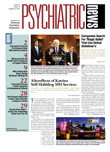Author Malcolm Gladwell, in his popular book The Tipping Point, describes a process by which dramatic changes can take place in the world in a seemingly sudden and unexpected fashion.
He argues that change often does not occur in proportional response to the pressure being applied, but rather change occurs when the accumulation of pressures on a system is great enough to overcome inertia. He refers to the point at which a system is poised to undergo dramatic change as the“ tipping point,” since it is at this point that the smallest of influences can turn out to be explosive.
Perhaps it is a stretch, but I have begun to wonder about the practice of psychiatry and whether we are approaching our tipping point.
It seems that pressure for change is coming from all quarters—advances in neuroscience and the application of new technologies are challenging the way we conceptualize mental illness, health care reform is challenging the way we provide services to our patients, and pressure to change our relationship with the pharmaceutical industry is challenging the ways in which we develop new therapies and educate practitioners. That all adds up to a lot of stress on the system.
If change is to occur, the key questions become whether we are in a position to direct this change, and do we have a vision for where we would like to go? These are questions that APA leaders have been struggling with and are attempting to address.
As part of this process, our immediate past president, Dr. Nada Stotland, appointed a work group to develop a list of priorities for APA to help the field make these transitions. The work group, led by Dr. Dilip Jeste, an at-large member of the Board of Trustees, began the process of defining APA's agenda for the future by organizing a focus group that met during the APA annual meeting in San Francisco in May.
Ideas presented at the focus-group meeting and from members of the work group were used to develop a survey for the APA membership. The survey addresses a broad range of topics including relationships with other medical professions, models for clinical practice, and the integration of science and clinical evidence into training and mental health care. The “Survey on the Future of Psychiatry” is available for members to complete, and they can do so until September 30. An e-mail with a link to the survey was sent to all members in early August and was resent on September 2. Members who have not received it can contact Miriam Epstein at
[email protected]. Members' survey responses will be used to prioritize the work of APA.
Another effort under way to prepare the field for future challenges is a series of town-hall meetings for members-in-training and early career psychiatrists. Headed by Dr. Carol Bernstein, APA president-elect, these meetings will provide a forum for participants to discuss the future of the field and APA's role in meeting the needs of its members and the patients they treat.
The town-hall meetings will be held in cities across the country over the next year. The series will begin in New York during next month's APA Institute on Psychiatric Services and will be held on Thursday, October 8, from 7 p.m. to 9 p.m. at the Sheraton New York Hotel and Towers.
Future meetings have tentatively been planned for Washington, D.C., Chicago, and San Francisco, with the final meeting to be held in New Orleans during the 2010 APA annual meeting. Residents and early career psychiatrists interested in participating in the New York meeting can find more information on the APA Web site at<www.psych.org/IPS> under “New Sessions Just Added to the Program” or by contacting Jill Gruber at
[email protected].
We all lead busy lives, and it is often very tempting to stand on the sidelines and watch a scene unfold. However, if we are truly at a tipping point, it may be worth remembering that even the smallest of influences can have a significant impact. That is why it is vital that APA hears from you via the survey and at the town-hall meetings. Your ideas could help determine the future of your field and this organization. ▪

